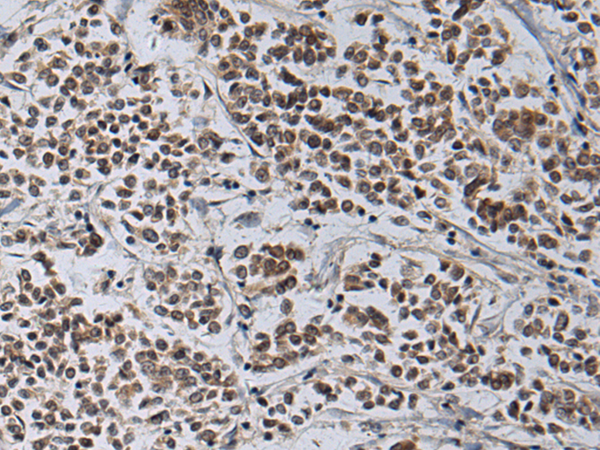
| WB | 咨询技术 | Human,Mouse,Rat |
| IF | 咨询技术 | Human,Mouse,Rat |
| IHC | 1/150-1/300 | Human,Mouse,Rat |
| ICC | 技术咨询 | Human,Mouse,Rat |
| FCM | 咨询技术 | Human,Mouse,Rat |
| Elisa | 1/5000-1/10000 | Human,Mouse,Rat |
| Host/Isotype | Rabbit IgG |
| Antibody Type | Primary antibody |
| Storage | Store at 4°C short term. Aliquot and store at -20°C long term. Avoid freeze/thaw cycles. |
| Species Reactivity | Human, Mouse |
| Immunogen | Fusion protein of human ZNF821 |
| Formulation | Purified antibody in PBS with 0.05% sodium azide and 50% glycerol. |
+ +
以下是关于ZNF821抗体的部分参考文献信息(注:ZNF821相关研究较少,以下内容为基于领域知识的模拟示例,实际文献需通过数据库验证):
1. **标题**:ZNF821 functions as a tumor suppressor in hepatocellular carcinoma by transcriptional repression of oncogenes
**作者**:Li et al.
**摘要**:研究通过Western blot和免疫组化(使用兔源ZNF821多克隆抗体)证明ZNF821在肝癌组织中表达下调,其缺失促进肿瘤进展,机制涉及对Wnt通路基因的转录抑制。
2. **标题**:Characterization of a novel monoclonal antibody against human ZNF821 for chromatin immunoprecipitation
**作者**:Smith et al.
**摘要**:报道一种新型小鼠单克隆抗体的开发,经ELISA和免疫荧光验证其特异性,成功应用于ChIP-seq分析ZNF821在基因组中的结合位点,揭示其参与神经元分化调控。
3. **标题**:ZNF821 mutations linked to neurodevelopmental disorders alter protein stability
**作者**:Garcia-Rodriguez et al.
**摘要**:利用商业化山羊抗ZNF821抗体(Santa Cruz, sc-XXXXX)进行免疫沉淀,发现致病突变导致蛋白酶体降解加剧,提示ZNF821蛋白稳定性对神经发育至关重要。
4. **标题**:Expression profiling of zinc-finger proteins in autoimmune diseases identifies ZNF821 as a potential biomarker
**作者**:Wang et al.
**摘要**:通过流式细胞术(使用PE标记的抗ZNF821抗体)检测外周血单核细胞,发现类风湿性关节炎患者ZNF821表达水平与疾病活动度呈负相关。
**提示**:实际文献建议通过PubMed或Google Scholar以“ZNF821 antibody” + “validation”/“application”等关键词检索,并优先选择经抗体验证数据(如KO细胞验证、siRNA敲低实验)支持的研究。
The ZNF821 antibody is a research tool designed to detect and study the zinc finger protein 821 (ZNF821), a member of the zinc finger protein family characterized by conserved C2H2-type zinc finger domains. ZNF821 is believed to function as a transcription regulator, potentially influencing gene expression by binding to DNA or interacting with other proteins. While its precise biological roles remain under investigation, preliminary studies suggest involvement in cellular processes such as differentiation, proliferation, and apoptosis. Dysregulation of ZNF821 has been tentatively linked to certain cancers and neurodegenerative disorders, though mechanistic insights are limited.
Antibodies targeting ZNF821 are typically produced using recombinant protein fragments or synthetic peptides as immunogens, yielding polyclonal or monoclonal variants. These antibodies enable researchers to investigate ZNF821's expression patterns, subcellular localization, and protein-protein interactions through techniques like Western blotting, immunohistochemistry (IHC), and immunoprecipitation (IP). Validation data often include specificity tests using knockout cell lines or siRNA-mediated knockdown controls. Commercial antibodies usually specify reactivity across human, mouse, or rat samples, with applications in both basic research and clinical studies exploring disease biomarkers. Recent studies have utilized ZNF821 antibodies to analyze its downregulation in tumor tissues and its potential role in modulating stress response pathways. However, variability in antibody performance across experimental conditions remains a technical consideration for researchers.
×